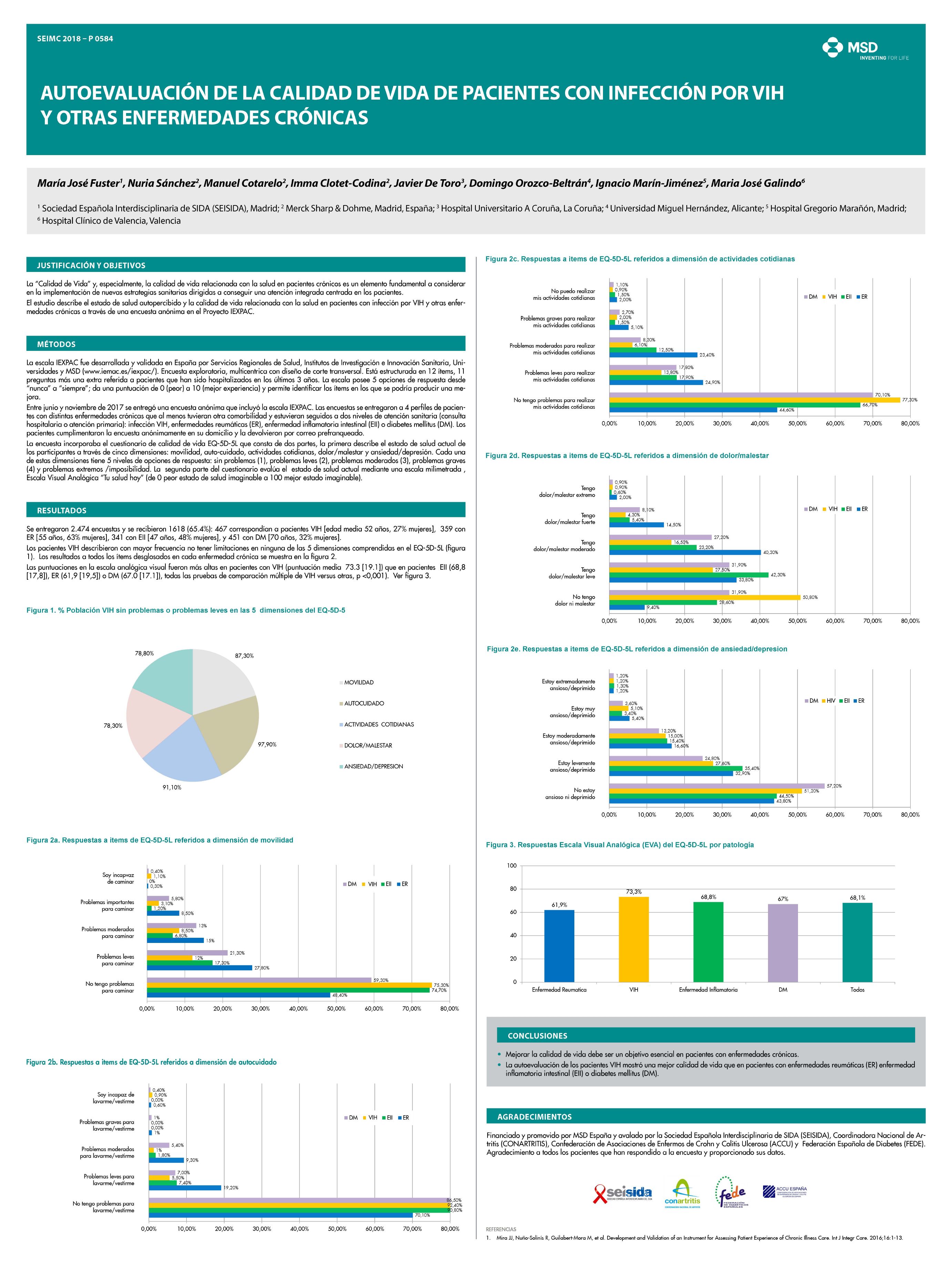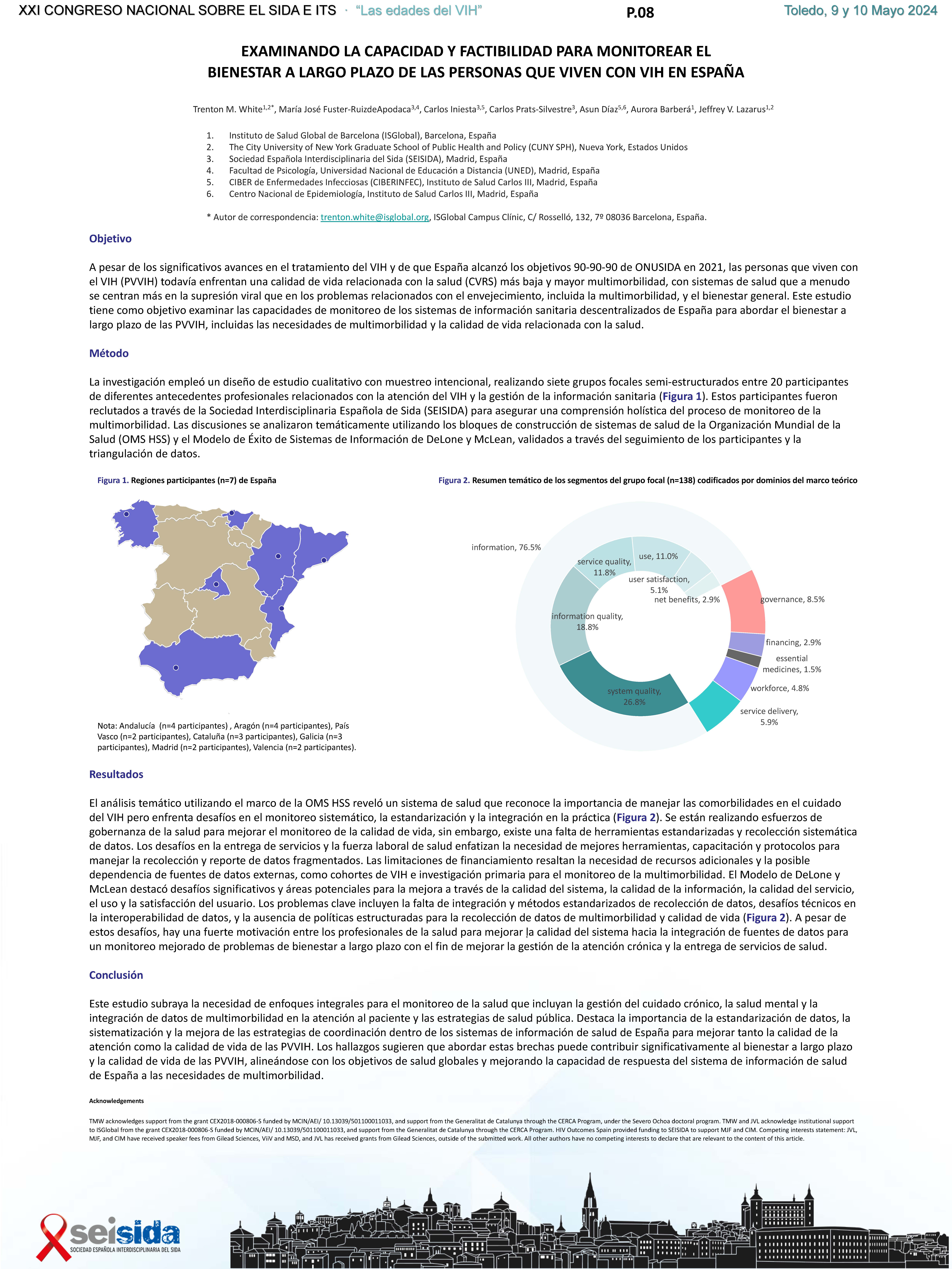Catálogo general VIH

Self-rated health among people living with HIV in Spain in 2019: a cross-sectional study
Resumen
Background: HIV infection has become a chronic disease and well-being of people living with HIV (PLHIV) is now of particular concern. The objectives of this paper were to describe self-rated health among PLHIV, on ART and on ART virally suppressed and to analyse its determinants. Methods: Data were obtained from a second-generation surveillance system based on a cross-sectional one-day survey in public hospitals. Epidemiological and clinical data were collected among HIV-infected inpatients and outpatients receiving HIV-related care the day of the survey in 86 hospitals in 2019. Self-rated health was measured using a question included in the National Health Survey: “In the last 12 months, how would you rate your health status?” an ordinal variable with five categories (very good, good, moderate, bad and very bad). For the analysis, these responses were dichotomized into two categories: 1 = very good/good and 0 = moderate, bad or very bad health status. Factors associated with very good/good self-rated health were estimated using logistic regression. Results: Of 800 PLHIV, 67.5% perceived their health as very good/good, 68.4% among PLHIV on ART and 71.7% of those virally suppressed. Having university education (adjusted odds ratio (aOR):2.1), being unemployed (aOR:0.3) or retired (aOR:0.2), ever being diagnosed of AIDS (aOR:0.6), comorbidities (aOR:0.3), less than 2 year since HIV diagnosis (aOR:0.3) and not receiving ART (aOR:0.3) were associated with good self-rated health. Moreover, among PLHIV on ART, viral load less than 200 copies (aOR:3.2) were related to better perceived health. Bad adherence was inversely associated with good self-rated health among PLHIV on ART (aOR:0.5) and of those virally suppressed (aOR:0.4). Conclusions: Nearly seven in 10 PLHIV in Spain considered their health status as very good/good, being higher among virally suppressed PLHIV. Both demographic and clinical determinants affect quality of life.
Autoría:
RUIZ ALGUERÓ, Marta; HERNANDO SEBASTIÁN, Victoria; MARCOS RODRÍGUEZ, María del Henar; GUTIÉRREZ, Gonzalo; PÉREZ ELÍAS, María Jesús; LÓPEZ-BERNALDO DE QUIRÓS, Juan Carlos; PULIDO ORTEGA, Federico; GÓRGOLAS,, Miguel; SANZ, Jesús; SUÁREZ GARCÍA , Inés; FERNÁNDEZ, María Teresa; LOSA GARCÍA, Juan Emilio; PÉREZ, José Luis; OLIVA LADRERO, María; PRIETO, Miguel Ángel; GONZÁLEZ, Gustavo; IZQUIERDO, Ana; VILORIA, Luis Javier; LÓPEZ, Irene; MARTÍNEZ, Eva; CASTRILLEJO, Daniel; ARANGUREN BALERDI, Rosa; BELMONTE, María Antonia; ARANDA GARCÍA, I. V.; ARRAIZA ARMENDARIZ, Antonio; DÍAZ FRANCO, Asunción
Autoría institucional: Hospital Survey Study Group
Autoría institucional: Hospital Survey Study Group
Ficha bibliográfica
- Año de publicación:
- 2021
- Publicación:
- [S.l.] : BioMed Central
- En :
- Número:
- Vol. 21: 129 (2021),12 p.
- Formato:
- Artículo
Contenidos relacionados
También te pueden interesar
-
Long-term health-related quality of life in people living with HIV who present to care with AIDS or severe immunodeficiency: the CoRIS AIDS survivors study
-
Autoevaluación de la calidad de vida de pacientes con infección por VIH y otras enfermedades crónicas
-
Examinando la capacidad y factibilidad para monitorear el bienestar a largo plazo de las personas que viven con VIH en España





